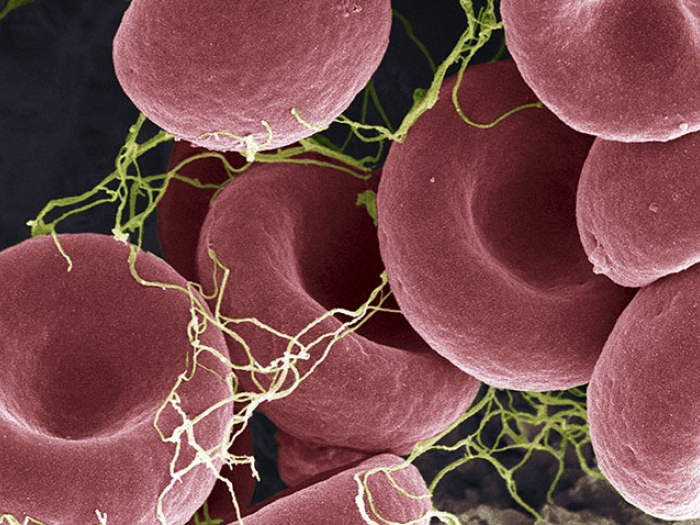No standard treatment exists for thrombocytopenia in patients with antiphospholipid syndrome, but this could change with a new treatment target
5:00 AM
Author |

Blood clots and pregnancy loss are commonly recognized features of antiphospholipid syndrome, but thrombocytopenia is the third most prevalent symptom, impacting up to half of antiphospholipid syndrome patients.
Thrombocytopenia is characterized by lower than normal platelets in the blood. Platelets are small cell fragments that play a crucial role in blood clotting. When the platelet count is low, it can result in difficulties in blood clotting, leading to potential bleeding or bruising.
The precise cause of thrombocytopenia in patients with antiphospholipid syndrome remains poorly understood.
Researchers at the University of Michigan Health have unveiled a new mechanism that drives thrombocytopenia and a potential clinically actionable biomarker for antiphospholipid syndrome associated thrombocytopenia.
Ray Zuo, M.D., M.S.C.S, an Edward T. and Ellen K. Dryer Early Career Professor of Rheumatology, and his team assessed the role of calprotectin, a stable marker of neutrophil extracellular trap formation, in influencing the development of various antiphospholipid syndrome clinical manifestations.
They measured calprotectin levels in a large group of antiphospholipid syndrome patients and those positive for antiphospholipid antibodies, comparing them to people with lupus, unexplained blood clots and healthy individuals.
High calprotectin levels were significantly associated with thrombocytopenia. To understand how calprotectin contributes to thrombocytopenia in antiphospholipid syndrome, they dug deeper.
They found that calprotectin triggers antiphospholipid antibody mediated thrombocytopenia by interacting with a platelet surface receptor called TLR 4 and activating a particular proinflammatory pathway called the NLRP3 inflammasome pathway, ultimately reducing platelet survival. Furthermore, there is a collaborative effect between calprotectin and antiphospholipid antibodies in causing harm to platelets, leading to their destruction.
“Our study offers valuable insights into how calprotectin might play a role in the development and progression of thrombocytopenia in antiphospholipid syndrome,” said Zuo, who is also an assistant professor of internal medicine at University of Michigan Health.
“Understanding this process could pave the way for improved methods of diagnosis and treatment for individuals with this condition.”
Zuo and his research team will continue to work to better understand antiphospholipid syndrome thrombocytopenia. Specifically, they will now investigate whether clinical testing for calprotectin could help identify antiphospholipid syndrome patients who are more likely to develop thrombocytopenia in the future. Insights gained from this research endeavor could guide more tailored and effective approaches to managing symptoms of antiphospholipid syndrome for patients.
“Given the rarity of antiphospholipid syndrome, collaborative research plays a crucial role in advancing our understanding of this condition,” continued Zuo.
“This study, conducted in collaboration with Mayo Clinic, is a clear testament to the significance of collective efforts in expediting progress in antiphospholipid syndrome research.”
Additional authors include: Sherwin A. Navaz, B.S., Kavya Sugur, Ph.D., Srilakshmi Yalavarthi, M.S., Cyrus Sarosh, M.S.A., Tristin Smith, M.P.H., Katarina Kmetova, M.S., Emily Chong, Noah F. Peters, Christine E. Rysengas, B.S., Gabriel Fiueroa-Parra, M.D., J. Michelle Kahlenberg, M.D., Ph.D., Jacqueline A. Madison, M.D., Jason S. Knight, M.D., Ph.D., Yu Zuo, M.D., all of the Division of Rheumatology, Department of Internal Medicine, University of Michigan, Ann Arbor, Michigan. Gary L. Norman, Ph.D., Headquarters and Technology Center, Autoimmunity, Werfen, San Diego, California. Dava Nelson, N.P., Jennifer Girard, M.D., Asra Z. Ahmed, M.D., Jordan K. Schaefer, M.D., Division of Hematology and Oncology, Department of Internal Medicine, University of Michigan, Ann Arbor, Michigan. Johann E. Gudjonsson, M.D., Ph.D., Department of Dermatology, University of Michigan, Ann Arbor, Michigan. Cynthia S. Crowson, Ph.D., Alí Duarte-García, M.D., M.Sc., Division of Rheumatology, Department of Internal Medicine, Mayo Clinic, Rochester. Minnesota.
This study was spearheaded by Claire Hoy and Somanathapura K. NaveenKumar of the University of Michigan Health APS Research Labs and made possible through a productive collaboration with Ali Duarte, M.D. and his team at the Mayo Clinic.
Citation: “Calprotectin impairs platelet survival in patients with primary antiphospholipid syndrome,” Arthritis and Rheumatology. DOI: https://doi.org/10.1002/art.42801
Sign up for Health Lab newsletters today. Get medical tips from top experts and learn about new scientific discoveries every week by subscribing to Health Lab’s two newsletters, Health & Wellness and Research & Innovation.
Sign up for the Health Lab Podcast: Add us on Spotify, Apple Podcasts or wherever you get you listen to your favorite shows.

Explore a variety of health care news & stories by visiting the Health Lab home page for more articles.

Department of Communication at Michigan Medicine
Want top health & research news weekly? Sign up for Health Lab’s newsletters today!





